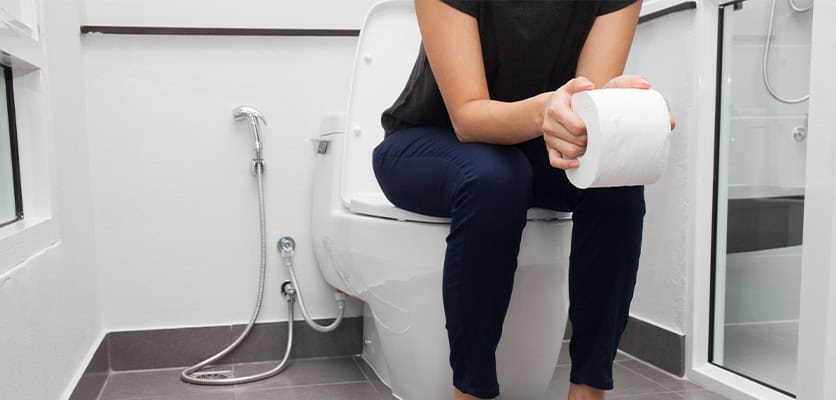Chronic constipation may seem like a mundane topic at first glance. However, it is a daily battle that many face in silence, struggling to answer nature’s call. It can feel like carrying an invisible burden that weighs on your daily routine, affecting everything from your mood to your productivity.
Do you feel weighed down by the relentless discomfort of chronic constipation? Fear not! From lifestyle tweaks to dietary do’s and don’ts, there are numerous ways to alleviate symptoms and ease the grip of constipation (pun intended!).
Constipation: Not just a symptom
Constipation involves infrequent and difficult bowel movements, occurring three times a week or less. It is not merely a discomfort, but a significant symptom that warrants attention. Moreover, it can indicate underlying medical conditions such as colon cancer, hypothyroidism (lack of thyroid hormone), Parkinson’s disease, diabetes, depression, and intestinal obstruction. It is also prevalent among the elderly, pregnant women, and patients who are immobile due to recent surgery or spinal cord injuries.
The roots of this discomfort

Many people mistakenly believe that constipation is a normal occurrence when in reality, it is not. Determining the root cause of constipation is essential, whether it originates within the colon, is influenced by external factors, or stems from habitual patterns.
Certain individuals may have naturally longer colons from birth, resulting in longer transit times and potential constipation. Others may experience constipation due to factors such as tumors or weakened pelvic floor muscles, which could be a result of previous surgery or trauma in that area.
Furthermore, poor bowel habits can significantly contribute to chronic constipation. These habits refer to behaviors that worsen or contribute to constipation, such as ignoring the natural urge to defecate, delaying bowel movements for extended periods, or avoiding defecation altogether.
Additionally, poor bowel habits can develop from early childhood if individuals frequently experience constipation and fail to establish healthy bowel routines. Over time, irregularity and difficulty with bowel movements become the norm for the individual.
Heeding the warning signs

Symptoms such as rectal bleeding, abdominal pain, and unexplained weight loss are concerning and should prompt further investigation to rule out the possibility of malignancy. In addition, be mindful of other symptoms such as bloating, a sensation of blockage in the rectum, hard stool, anal pain, stomach pain, and cramps. It is crucial not to overlook these symptoms, as they serve as red flags for potential serious conditions.
Colonoscopy is typically recommended for early detection, especially for patients with a family history of colon cancer or those aged 50 years and above, regardless of the presence of warning signs. This screening procedure plays a vital role in the early detection and prevention of colorectal cancer, allowing for timely intervention and improved outcomes.
Do not wait, act now!
Constipation is considered as chronic if it persists for at least 12 weeks within a year, whether concurrently or cumulatively. If left unmanaged, chronic constipation can lead to a series of uncomfortable and potentially serious symptoms. These may include abdominal bloating, discomfort during bowel movements, rectal bleeding, the development of hemorrhoids, and even low back pain. Furthermore, individuals may experience complications such as anal fissures, urinary retention, and rectal prolapse.
In severe cases, chronic constipation can result in bowel obstruction caused by impacted stool. Impacted stool occurs when feces become hardened and compacted within the rectum or colon, making them difficult to pass. This condition may manifest as severe abdominal distension and vomiting, requiring medical intervention to relieve the blockage.
Finding relief through practical solutions
If constipation is not attributed to underlying medical conditions or medication side effects, several measures can be taken to alleviate the symptoms and improve bowel function.
1. Increase dietary fiber intake

2. Enough hydration

Ensuring adequate hydration is essential for overall health and in preventing constipation. It is recommended to increase water intake to at least eight glasses a day, with each glass containing approximately 250 milliliters. However, it is important to note that individuals with heart failure or kidney disease may need to adjust their fluid intake under the guidance of a healthcare professional.
Additionally, it is beneficial to be mindful of the diuretic effects of caffeine, tea, and alcohol, which can increase urine output and potentially lead to dehydration. Therefore, reducing or abstaining from these beverages may help in maintaining proper hydration levels and prevent constipation.
3. Regular physical activities

Engaging in regular physical activities, such as exercise, can promote healthy colonic function. By participating in more physical activity, individuals are able to stimulate and activate colon movements.
4. Seek professional help

Seeking professional help for chronic constipation can provide individuals with personalized care and guidance to effectively manage their symptoms and improve their quality of life. Besides, medications are commonly prescribed to alleviate constipation. In some cases, individuals may need to take these medications for an extended period to effectively manage their symptoms. Typically, these medications are recommended when lifestyle changes, such as increasing fiber intake, staying hydrated, and engaging in physical activity have proven ineffective in providing relief from constipation.
Share:
Was this article helpful?
Share:
Was this article helpful?
Health Packages
Elevate your health with tailored health packages at Columbia Asia Hospital. Take charge of your health journey today.
AIA Policyholders Self-pay Benefits
Pink October 2024
From
RM80

